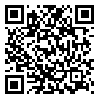Thu, Jan 29, 2026
Volume 8, Issue 3 (Summer 2022)
Caspian J Neurol Sci 2022, 8(3): 163-170 |
Back to browse issues page
Download citation:
BibTeX | RIS | EndNote | Medlars | ProCite | Reference Manager | RefWorks
Send citation to:



BibTeX | RIS | EndNote | Medlars | ProCite | Reference Manager | RefWorks
Send citation to:
Sedighinejad A, Khoshrang H, Soltanipour S, Rezvani S M, Soleimani R, Haghighi M, et al . Atracurium as an Alternative to Succinylcholine in Electroconvulsive Therapy: A Randomized Clinical Trial. Caspian J Neurol Sci 2022; 8 (3) :163-170
URL: http://cjns.gums.ac.ir/article-1-547-en.html
URL: http://cjns.gums.ac.ir/article-1-547-en.html
Abbas Sedighinejad *1 

 , Hossein Khoshrang1
, Hossein Khoshrang1 

 , Soheil Soltanipour2
, Soheil Soltanipour2 

 , Seyed Mahmood Rezvani3
, Seyed Mahmood Rezvani3 
 , Robabeh Soleimani4
, Robabeh Soleimani4 

 , Mohammad Haghighi1
, Mohammad Haghighi1 

 , Siamak Rimaz1
, Siamak Rimaz1 

 , Gelareh Biazar1
, Gelareh Biazar1 




 , Hossein Khoshrang1
, Hossein Khoshrang1 

 , Soheil Soltanipour2
, Soheil Soltanipour2 

 , Seyed Mahmood Rezvani3
, Seyed Mahmood Rezvani3 
 , Robabeh Soleimani4
, Robabeh Soleimani4 

 , Mohammad Haghighi1
, Mohammad Haghighi1 

 , Siamak Rimaz1
, Siamak Rimaz1 

 , Gelareh Biazar1
, Gelareh Biazar1 


1- Anesthesiology Research Center, Department of Anesthesiology, Alzahra hospital, Guilan University of Medical Sciences, Rasht, Iran
2- Department of Community Medicine, School of Medicine, Guilan University of Medical Sciences, Rasht, Iran
3- Student Research Committee, Department of Anesthesiology, Alzahra hospital, Guilan University of Medical Sciences, Rasht, Iran
4- Department of Psychiatry, Kavosh behavioral, cognitive and addiction research center, Shafa hospital, Guilan University of Medical Sciences, Rasht, Iran
2- Department of Community Medicine, School of Medicine, Guilan University of Medical Sciences, Rasht, Iran
3- Student Research Committee, Department of Anesthesiology, Alzahra hospital, Guilan University of Medical Sciences, Rasht, Iran
4- Department of Psychiatry, Kavosh behavioral, cognitive and addiction research center, Shafa hospital, Guilan University of Medical Sciences, Rasht, Iran
Abstract: (2119 Views)
Background: Electroconvulsive Therapy (ECT) is a successful treatment option for various psychiatric disorders. It is performed under general anesthesia where succinylcholine is the preferred muscle relaxant in this process. However its several contraindications and potential adverse effects, and the fact that it is not always available should be considered. Therefore, finding an effective and safe alternative is crucial.
Objectives: This study aims to assess the safety and efficacy of atracurium in ECT.
Materials & Methods: This single-blind clinical trial was conducted at Shafa hospital affiliated to Guilan University of Medical Sciences from November 2020 to April 2021. Participants were 67 eligible patients with ECT, randomly assigned into two groups receiving succinylcholine (0.5 mg/ kg), and atracurium (0.2 mg/kg). Seizure duration, hemodynamic parameters, the time to return to spontaneous breathing, and recovery time were assessed and compared between the two groups.
Results: Seizure duration was longer in the succinylcholine group (P=0.071), while the time to return to spontaneous breathing (P=0.0001) and the recovery time (P=0.0001) were significantly longer in the atracurium group. The trend of changes in the Mean Arterial Pressure (MAP) and Heart Rate (HR) were significant over time; however, the difference between the two groups was significant only in HR one minute after the seizure induction (P=0.001). None of patients was reported serious adverse effects.
Conclusion: When succinylcholine can't be used, atracurium can be a safe alternative in the ECT process.
Objectives: This study aims to assess the safety and efficacy of atracurium in ECT.
Materials & Methods: This single-blind clinical trial was conducted at Shafa hospital affiliated to Guilan University of Medical Sciences from November 2020 to April 2021. Participants were 67 eligible patients with ECT, randomly assigned into two groups receiving succinylcholine (0.5 mg/ kg), and atracurium (0.2 mg/kg). Seizure duration, hemodynamic parameters, the time to return to spontaneous breathing, and recovery time were assessed and compared between the two groups.
Results: Seizure duration was longer in the succinylcholine group (P=0.071), while the time to return to spontaneous breathing (P=0.0001) and the recovery time (P=0.0001) were significantly longer in the atracurium group. The trend of changes in the Mean Arterial Pressure (MAP) and Heart Rate (HR) were significant over time; however, the difference between the two groups was significant only in HR one minute after the seizure induction (P=0.001). None of patients was reported serious adverse effects.
Conclusion: When succinylcholine can't be used, atracurium can be a safe alternative in the ECT process.
Type of Study: Research |
Subject:
Special
Received: 2022/07/12 | Accepted: 2022/07/19 | Published: 2022/07/1
Received: 2022/07/12 | Accepted: 2022/07/19 | Published: 2022/07/1
| Rights and permissions | |
 | This work is licensed under a Creative Commons Attribution-NonCommercial 4.0 International License. |



